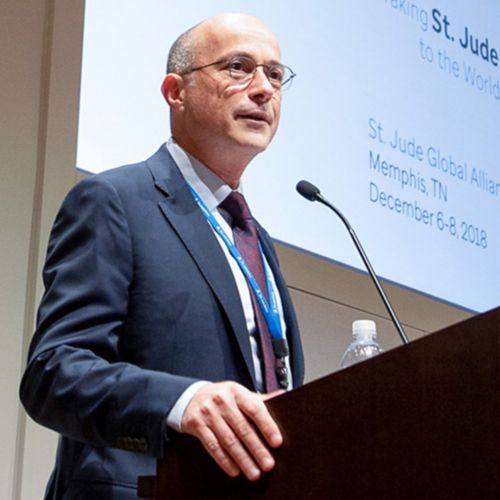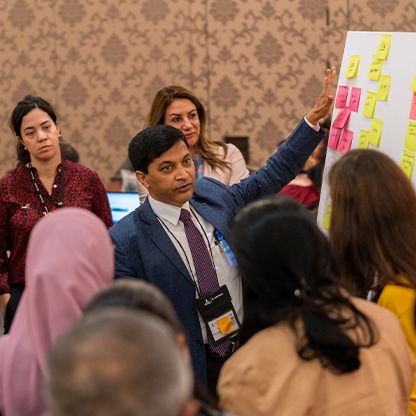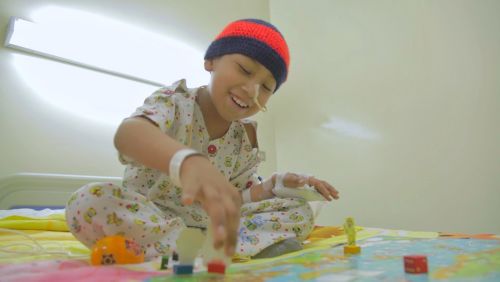St. Jude Family of Websites
Explore our cutting edge research, world-class patient care, career opportunities and more.
St. Jude Children's Research Hospital Home

- Fundraising
St. Jude Family of Websites
Explore our cutting edge research, world-class patient care, career opportunities and more.
St. Jude Children's Research Hospital Home

- Fundraising
Global Scholars: Dr. Liliana Vasquez Ponce
Other Global Scholars Projects:
Health inequities drive Dr. Vasquez to broaden focus across Latin America
Dr. Liliana Vasquez Ponce remembers, vividly, sitting in the audience at a conference of the International Society of Pediatric Oncology in 2018.
The group was viewing the documentary film, How I Live, which profiles children around the world who have faced cancer.
“I saw those faces in the film and I realized I saw the same faces my country,” says Vasquez, a Peruvian national. “People who are dying because they’re poor, because they don’t have enough money to be in Lima to receive treatment.”
It was a pivotal moment that inspired Vasquez to transition from pediatric oncology clinical practice to explore a new path in public health. The change took her to the Peruvian Ministry of Health and then the Pan American Health Organization’s (PAHO) Global Initiative for Childhood Cancer. In these roles, she worked for passage of Peru’s childhood cancer law, which was enacted in 2020. In addition, she focused on other projects, including a national strategy to address pediatric cancer treatment abandonment, hospital quality improvement projects and campaigns to promote early cancer diagnosis.
In February 2021, Vasquez’s role at PAHO expanded to include overseeing childhood cancer initiatives in Peru and in other Latin American countries. As president of the Latin American Society of Pediatric Oncology, she brought fresh insights, perspectives and connections to her new role.
“I was feeling inside that I could help a lot,” she says. “Because we have a really solid network of colleagues in different countries. And they’re very motivated. They want to make a difference.”

“Different groups have the same objective to move forward on childhood cancer,” she says. “But they don’t have a unique strategy to work together.” -- Dr. Liliana Vasquez Ponce
Indeed, one of Vasquez’s goals is to replicate some of Peru’s successes in other countries. “What was special from the Peruvian experience is that we learned a lot from our mistakes,” she says. For example, five years ago, there were a variety of professional, government and other groups with common goals related to childhood cancer patients and their families but they were not working together. “So it was very difficult to get to an articulated strategy for my country,” Vasquez says.
She sees other countries in a similar situation. “Different groups have the same objective to move forward on childhood cancer,” she says. “But they don’t have a unique strategy to work together.”
Vasquez’s Global Scholars Project seeks to develop a sustainable strategy to bring people together to achieve common goals. She is starting with the goal of improving treatment of febrile neutropenia in pediatric cancer patients.
These patients need antibiotics within one hour of developing an infection. But in Peru it sometimes takes patients 24 hours to even reach a hospital. “What is happening during all these 24 hours is basically the objective of my capstone,” Vasquez says. “I want to know what initial interventions we could use to reduce this time interval?”
For her Global Scholars Project, Vasquez is planning parent focus groups to understand what causes the delays. Is it distance? Is it a lack of parental awareness about the risk fever poses to cancer patients? She is considering developing educational resources on the topic and examining how other countries have addressed the issue.
She says the project will also reflect all she’s learned from her Global Scholars classmates. That includes their shared challenges, perspectives and friendships. “St. Jude is helping us in so many projects, so many ideas, and is always encouraging us to build our own journey, to follow our passions. And that is so wonderful,” Vasquez says.


